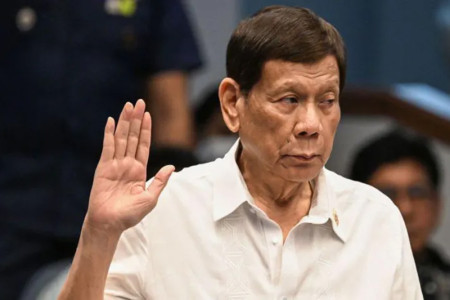In his first testimony before an official investigation on his so-called war on drugs, the 79-year-old said the squad was made of gangsters, adding that he would tell them "kill this person, because if you do not, I will kill you now".
Duterte won the presidency by a landslide in 2016 on the promise of replicating his anti-crime campaign in Davao city on a national scale.
The nationwide drug war saw thousands of suspects killed in controversial police operations and is now being investigated by the International Criminal Court.
During the senate hearing on Monday, Duterte also said he told police officers to "encourage" suspects to fight back so officers could justify the killings.
"Do not question my policies because I offer no apologies, no excuses. I did what I had to do, and whether or not you believe it... I did it for my country," said Duterte in his opening statement.
"I hate drugs, make no mistake about it."
However, he denied that he gave his police chiefs permission to kill suspects, adding that his "death squad" was made of "gangsters... not policemen".
"I can make the confession now if you want. I had a death squad of seven, but they were not police, they were gangsters."
Duterte also remained defiant, claiming that many criminals had resumed their illegal activities after he stepped down as president.
"If given another chance, I'll wipe all of you," he said.
His appearance on Monday was the first time he had showed up at an inquiry into his anti-drug campaign since his term ended in 2022.
It was also the first time he directly faced some of his accusers, including families of victims of the drug war and former senator Leila de Lima, a Duterte critic who was jailed for seven years on a drug-dealing charge that was eventually dropped.
The Philippine government estimates that more than 6,252 people have been gunned down by the police and "unknown assailants" in Duterte's "war on drugs". Rights groups say the numbers could actually run into the tens of thousands.
An earlier report by the UN's High Commisioner for Human Rights found that Duterte's drugs crackdown had been marked by high-level rhetoric that could be seen as giving police officers "permission to kill".
Police said many of their victims, who they claimed were drug lords or peddlers, were often killed in "self defence" during shoot-outs. But many families claim their sons, brothers or husbands were simply in the wrong place at the wrong time.
The war on drugs campaign was controversial and drew huge international criticism, but it also had its share of supporters in a country where millions use drugs, mostly methamphetamine, known locally as "shabu".
BBC


